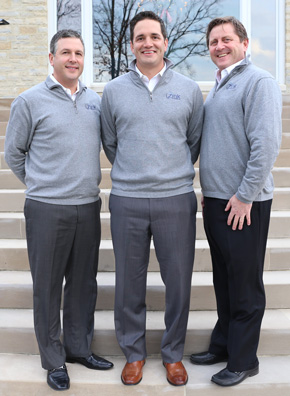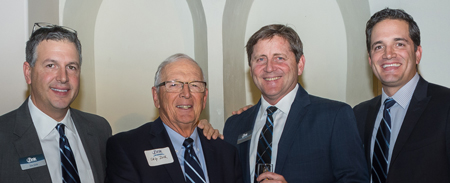
Announcing the move of Zink Foodservice from a family owned business to an ESOP are (left to right) Jim Zink, Tim Zink and Mike McGuire.
In addition to the changes that any company experiences during the course of a more than 40‑year history, Zink Foodservice, led by Jim Zink and Mike McGuire, made the major change last year from a family-owned business to an Employee Stock Ownership Program (ESOP).
Zink Foodservice provides comprehensive sales, marketing, distribution and installation services for manufacturers and authorized dealers of foodservice equipment and smallwares. The agency, headquartered in Westerville, Ohio, has more than 70 associates (40 of whom are focused on sales), located in 10 office locations and four culinary centers in Columbus and Cincinnati, Ohio; Chicago and Indianapolis.
(As described in the June 2018 issue of Agency Sales, an ESOP is a defined contribution plan that must meet IRS requirements for a retirement plan and is regulated by the Employee Retirement Income Security Act (ERISA). An ESOP buys back employees’ shares when they retire, and can even take out a loan to buy back those shares.)
To mark the change to an ESOP, Jim Zink, managing partner, was the first of several Zink associates in a YouTube video produced by the agency that explained the move.
Introduction to the Business
In a separate conversation with Agency Sales magazine, Zink recalled his first exposure to the food service business that was started by his father (Skip Zink) more than 40 years ago. “My father was the vice president of sales for different food service equipment companies when I was growing up in Buffalo, New York.” Zink recounts how his father recognized a trend toward chain restaurants that was developing. He noticed how chains such as Arby’s, Bob Evans, White Castle, Dominos, Wendy’s, KFC and others, were growing in the Ohio, Kentucky, Michigan, Indiana areas and creating virtual hotbeds of activity. As he saw this happening in the ’70s he recognized the opportunity and started the agency. “He was a true entrepreneur and took incredible risks as a 35-year-old with three young kids. I can still remember at the beginning when he’d leave home on a Sunday evening, work the territory and return home late Friday night. This was his schedule 40-45 weeks a year for several years.”
Zink readily admits that as he was growing up “I didn’t really understand what our business was. I went on to college at the University of Notre Dame and got my masters’ degree there. I had just completed a training program with a financial services company in Chicago when my father said to me that if I was ever interested in giving the agency business a shot, now was the time. I wasn’t married, no children. If I liked what I saw, fine; I would stay. If I didn’t like it, I could make a change. He had an open slot for me in Cleveland, which was far enough from the home office for me to be on my own, but still close enough for him to mentor me.” Zink joined the business in 1996.

The agency’s founder Skip Zink (second from left) joined Jim Zink, Mike McGuire and Tim Zink when the company’s ESOP announcement was made earlier this year.
Industry Changes
Since joining the company more than 20 years ago, Zink has seen any number of changes in the food service industry. “It used to be that we would be the primary providers of information and expertise to the channel. Today it’s a lot more than just the delivery of material to people. Today customers can get a lot of information they need on their own, any place and any time. So while we are still in the information business, we find ourselves identifying broader, more strategic ways to add value and influence purchasing decisions. Efficiency, responsiveness, speed and trust remain vital components of our success. Customers are concerned with who is going to give them quality solutions and service — and you’ve got to be easy to do business with!”
Finally there’s the contribution that technology has provided, he continued. “As technology developed and continues to develop, everything and everyone is faster. We’re not operating with mom-and-pop companies anymore. Customers and manufacturers require information faster than ever before. As an example, consider for a moment the symbiotic relationship we have with our manufacturers. We can be in their information systems and they can be in ours constantly as we share information with each other. The days of being protective with your information are over. Now it’s all about making use of open architecture.
“The rep that can’t keep up with these changes — or who balks at embracing change — is simply going to be looked at as a dinosaur.”
Industry Consolidation
In addition to being able to address the challenges that change presents to his agency, Zink continues that there are a couple of developments that he remains concerned with. “The first thing is the consolidation trend in our industry. It’s not just on the manufacturing side, but also with the distribution channel and reps. You’ve got to pay attention to developments and think about what this means to you and your business for the future. We’ve got to ask and then answer the question ‘What do we need to look like to thrive in a consolidated environment?’”
Attracting Talent
A second area of concern — and it’s probably one that he shares with reps in other industries — is that of attracting talent to the profession. “How do we attract and retain talent to our business? What we’re working in is a fantastic industry. I know because I grew up in the rep industry. But the fact remains that being a rep is not something that is emphasized. You don’t read about it in the media and you don’t hear about it in schools. The reality of it is that there are a ton of industries that depend on this business model to take their products to market. More has to be done to educate people.”
In terms of attracting personnel to Zink Marketing, Zink notes, “Right now, we’re fortunate in our position in the marketplace. Although we’re always trying to do a better job when it comes to recruiting, we’ve got a lot of great people who are seeking us out.”
This view of the present now takes us back to the video mentioned earlier. At the outset of the video produced by the agency late last year, Zink explained that about a decade ago company management got together with manufacturers and addressed the question of what the company had to do in order to be successful for the future. “We asked about what we needed to do about management, from a CRM standpoint, whether we needed a culinary team, etc. We put everything on the table. I look back at that time as the point when we laid the groundwork for the next decade.”
Move to an ESOP
In explaining the ultimate move to an ESOP, Mike McGuire, says, “As we were looking to the future there were a couple of things that contributed to our decision. We realized that we needed a succession plan. Jim is nine years younger than I am, and Tim Zink is nine years younger than Jim. So there are going to be some changes to address in the future. At the same time, consolidation is common in our industry and we’ve been approached by a couple of consolidators. That got us thinking. We asked the question: What’s the right way to position ourselves for the future? We determined that, at our size, a typical buyout wasn’t really the best thing for us. If we followed that course, chances are the company could be cash strapped for the future. We wanted a solution that was good for our people, our manufacturers, our customers and for us. Based on this criteria, it became clear that we were ‘poster children’ for becoming an ESOP.”
He continues that to get to that point was a fairly lengthy proposition, but along the way “We really didn’t encounter any problems. It was interesting and fun and provided us with plenty of things to think about.”
Determining Benefits
Returning to the video, which explains much of the agency management thinking, the point is made that “We have changed so much. In any business you must look around and ask what does the future hold for the next two to three decades? What’s most beneficial for our manufacturers, customers, employees?”
It is explained that the change allows Zink Marketing to remain aggressive in the marketplace while still being able to invest in the company. It also provides the ability for the agency to look for the best people, both inside and outside of the organization. McGuire states, “We look to an ESOP to ensure that we maintain our culture. When you look at a sales agency, all we really have are two assets — our intellectual property and our team. Once you provide the members of the team with a stake in the company, they can see how the company grows and how their decisions will affect all of us in a positive way.
“The move allows us to leverage our strength in our people and creates more teamwork. We will be able to do all that we do and more for our manufacturers and customers.” The video concludes with the following words, which argue well for the future — “Our tag line, ‘Invested in your Success’ has never been more true than it is now.”
MANA welcomes your comments on this article. Write to us at [email protected].

